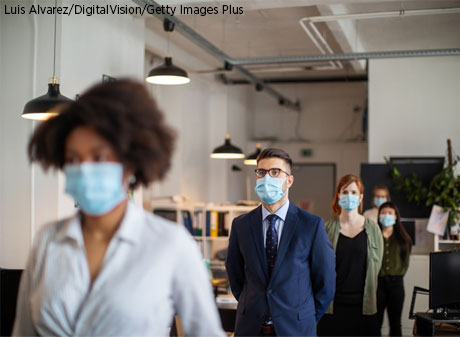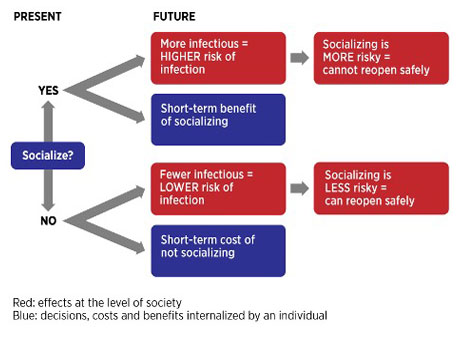Should a Pandemic Necessitate Social Distancing?

Do the effects of one person’s actions on another provide insight into whether physical distancing is warranted during a deadly virus outbreak?
St. Louis Fed Research Officer Guillaume Vandenbroucke considered this in a Regional Economist article. Examining externalities—a cost or benefit imposed by one or more parties’ actions on another who has no say in the matter—Vandenbroucke pondered the impact of an individual who foregoes social distancing.Vandenbroucke defines social distancing as a collection of measures that may reduce the transmission of a virus, including physical distancing, mask wearing, reduced travel and other preventive efforts.
Risks Borne by Other People
Vandenbroucke discussed two externalities when individuals shun social distancing. The first is similar to when an inebriated person drives or a factory pollutes: Third parties are immediately more at risk of becoming infected with the virus.
If it were possible, the infectious person could pay third parties to be allowed to engage socially, just like a polluter could pay to be allowed to produce.The author added that the opposite solution is conceivable: A third party could pay the producer to reduce its pollution. Conversely, society could pay the infectious person to stay home, such as offering unemployment benefits.
“These payments reveal the negative externality of social interactions: Absent any interventions or regulations, there would be too many,” Vandenbroucke wrote.
Lack of Cost to the Offender
The second externality arises when infected people do not internalize the effect of their own behavior in the spread of the virus. As they move about, secondary infections proliferate, sparking further spread, the author explained.
Yet if distancing is immediately imposed when a virus breaks out, the number of infections drops and, consequently, so do the number of secondary infections.
“With fewer infectious people, the risk of new infections diminishes, and it becomes possible to relax the social-distancing mandate without risking a spike in infections—and it becomes possible to reopen the economy,” Vandenbroucke wrote.
Why Socially Distance?
Accounting for these externalities shows that early distancing mandates bring benefits: the ability to lower the future proportion of infections and, therefore, to reopen the economy (or to relax social-distancing measures without spreading more infections). Yet this benefit to society is not internalized by all individuals. So, the benefit of early distancing is lower for an individual than it is for society, according to Vandenbroucke.
“It follows that social distancing must be less than optimal for society in the absence of an early mandate,” the author wrote.
The scenario changes considerably if there are no asymptomatic carriers of the virus, he wrote. In the extreme case in which infectious people would be immediately sick and quarantined, an asymptomatic person would not put anyone at risk by being social: The externality would not exist.
Vandenbroucke notes that his argument assumes that most people aren’t altruistic. Altruistic people who care about the entire populace internalize all the costs and benefits of their actions. Government interventions, he added, would be unnecessary in such a world.
Conclusion
Distancing should be mandatory in a pandemic such as the current coronavirus outbreak, Vandenbroucke wrote, because there are benefits that cannot be internalized by individuals. In particular, early reopening of the economy is not viewed as a benefit of social distancing by a single individual, because individuals do not internalize the impact of their own decisions on the evolution of the disease.
Notes and References
- Vandenbroucke defines social distancing as a collection of measures that may reduce the transmission of a virus, including physical distancing, mask wearing, reduced travel and other preventive efforts.
- The author added that the opposite solution is conceivable: A third party could pay the producer to reduce its pollution.
Additional Resources
- On the Economy: The Household Shift from Paid Work to Home Production
- On the Economy: COVID-19’s Impact on U.S. Home Production
- Regional Economist: Should Social Distancing Be Mandatory during a Pandemic?
Citation
ldquoShould a Pandemic Necessitate Social Distancing?,rdquo St. Louis Fed On the Economy, Feb. 22, 2021.
This blog offers commentary, analysis and data from our economists and experts. Views expressed are not necessarily those of the St. Louis Fed or Federal Reserve System.
Email Us
All other blog-related questions


